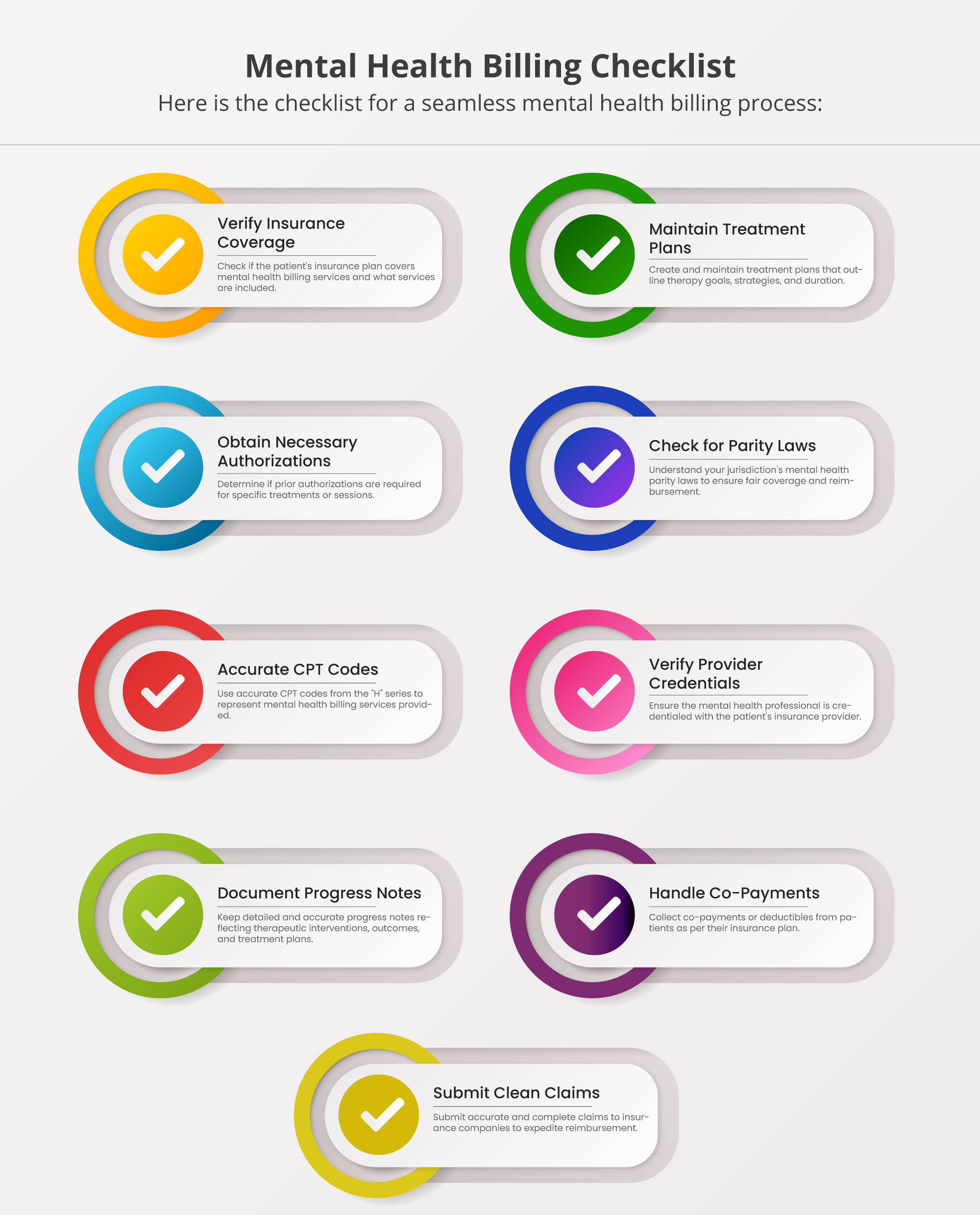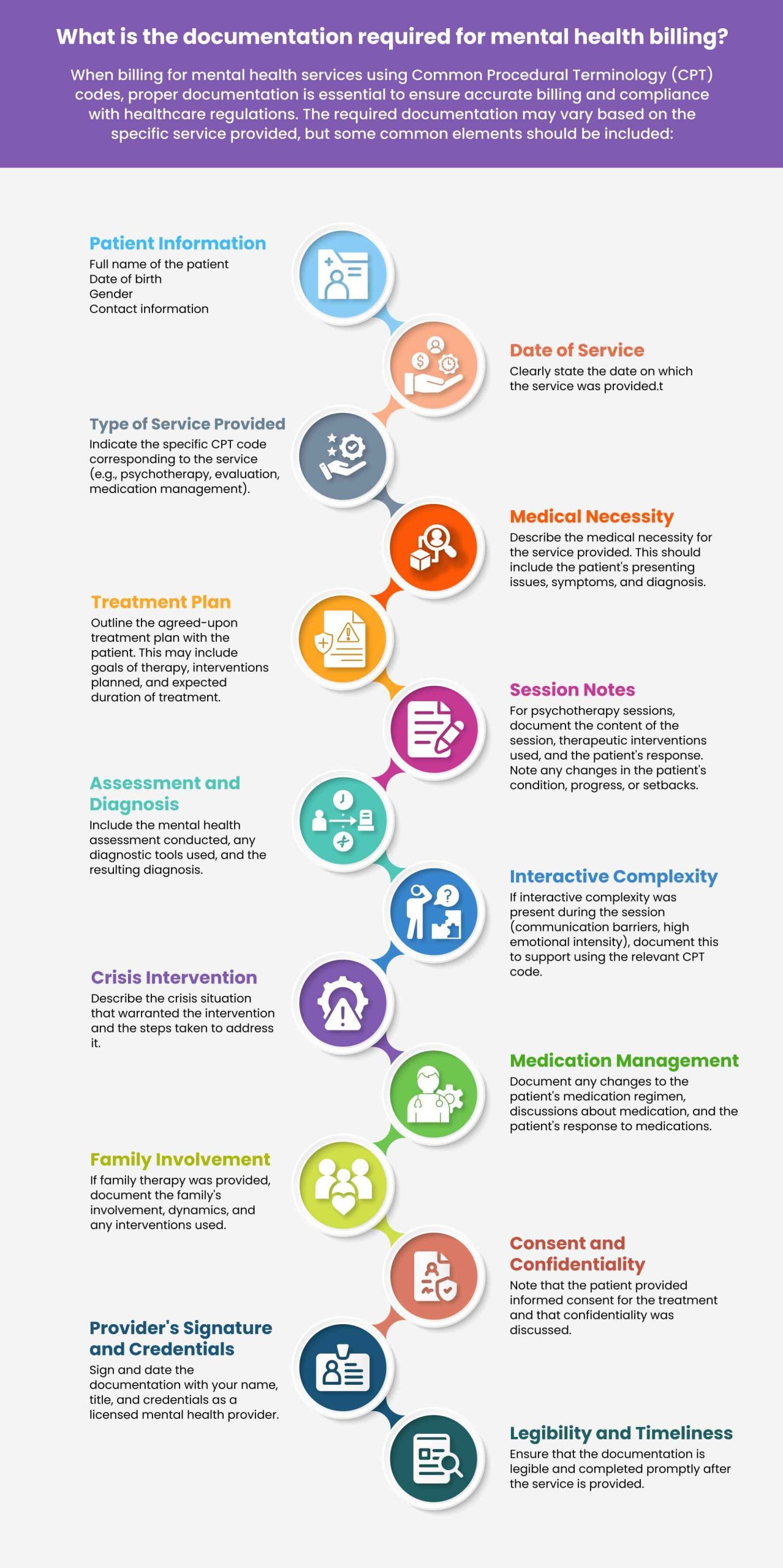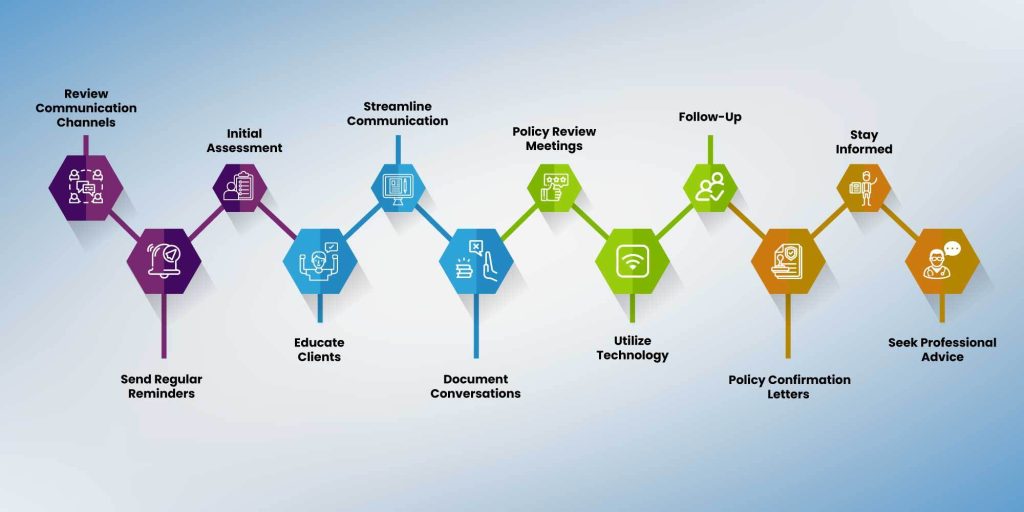Overview
Running a successful mental health clinic can be fraught with challenges, especially when encountering mental health billing issues or dealing with overdue accounts receivable. But don’t let these problems disrupt your thought process or weigh you down. As a responsible clinical practitioner, taking charge and addressing these challenges head-on is crucial.
So, who’s liable for the complexities of medical health billing? Determining who is responsible for the intricacies of medical health billing can be challenging. Could it be the in-house billing team, your previous billing company, or perhaps a lack of knowledge on the subject? Regardless of the root cause, taking responsibility for the situation and thoroughly understanding mental health billing procedures before seeking a resolution is essential.
This article post aims to answer some commonly asked questions about mental health billing. By taking action and implementing the recommendations outlined here, you can ensure seamless billing management for your clinic and stay ahead of the curve.
What are Mental Health Billing Services?
Mental health billing submits insurance claims for mental health services. Claims must be accurate, and including all relevant details is essential. It helps ensure that patients receive the coverage they deserve and that providers are compensated for their services. Mental health billing can be complex and time-consuming, but ensuring claims are appropriately submitted is essential.
Errors in billing can lead to delays or even denials of coverage and can be detrimental to both patients and providers. To avoid such issues, it is essential to take the time to review all submitted claims and check for any errors before they are submitted. To ensure compliance and accuracy, you must stay up-to-date on any changes to the psychiatry billing process.
How is Mental Health Billing Different from Medical Billing?
Mental health billing and medical billing both involve the process of submitting and processing claims for reimbursement from insurance companies or other payers. However, the two have some key differences due to the unique nature of mental health services and the specific codes and regulations associated with them. Here are some main differences:
Diagnostic Codes
Mental health billing often uses different diagnostic codes from medical billing. The International Classification of Diseases (ICD-10) codes 10th Revision commonly represent medical conditions in medical billing. Diagnostic and Statistical Manual of Mental Disorders, 5th Edition (DSM-5) codes are used to identify various mental health diagnoses in mental health billing.
Therapy Services
Mental health services often include various types of therapy, such as psychotherapy or counseling. These services are typically billed differently from medical procedures or interventions. The Current Procedural Terminology codes used for therapy services in mental health are specific to the type of therapy provided.
Provider Type
Psychiatrists, psychologists, or counselors often provide mental health services. On the other hand, medical services are provided by physicians, nurses, and other medical practitioners. Different provider types may have different billing requirements and codes associated with their services.
Treatment Plans
Mental health treatment plans can involve ongoing therapy sessions over a longer duration than many medical treatments. This can lead to differences in how billing is structured, with mental health billing often accommodating multiple sessions over time.
Coverage and Reimbursement
Insurance coverage and reimbursement rates for mental health services can vary from those for medical services. Some insurance plans have different co-pays, deductibles, and coverage limitations specifically for mental health care.
Parity Laws
In many places, laws are in place to ensure mental health parity, which means that insurance plans should cover mental health services at the same level as medical services. This can impact the billing and reimbursement processes, as insurance companies are required to provide equitable coverage for both.
Authorization Requirements
Insurance companies may have different authorization and pre-approval processes for mental health services than medical services. It can affect how and when services are billed and reimbursed.
Documentation Requirements
Documentation for mental health services often includes detailed progress notes, treatment plans, and assessments of the patient’s mental health status. These documents are crucial in justifying the necessity of services during the billing process.
Coding Expertise
Psychiatry billing professionals specializing in mental health billing must understand mental health-specific codes, regulations, and documentation requirements. Similarly, those dealing with medical billing require medical codes and terminology knowledge.
Mental health practitioners and billing professionals must be well-versed in the specific requirements of mental health billing to ensure accurate claims submission and appropriate reimbursement for the services provided.
What are the Specific Requirements for Mental Health Billing?
Here is the checklist for a seamless mental health billing process:
Verify Insurance Coverage
Check if the patient’s insurance plan covers mental health billing services and what services are included.
Obtain Necessary Authorizations
Determine if prior authorizations are required for specific treatments or sessions.
Accurate CPT Codes
Use accurate CPT codes from the “H” series to represent mental health billing services provided.
Document Progress Notes
Keep detailed and accurate progress notes reflecting therapeutic interventions, outcomes, and treatment plans.
Maintain Treatment Plans
Create and maintain treatment plans that outline therapy goals, strategies, and duration.
Check for Parity Laws
Understand your jurisdiction’s mental health parity laws to ensure fair coverage and reimbursement.
Verify Provider Credentials
Ensure the mental health professional is credentialed with the patient’s insurance provider.
Handle Co-Payments
Collect co-payments or deductibles from patients as per their insurance plan.
Submit Clean Claims
Submit accurate and complete claims to insurance companies to expedite reimbursement.
Note that these checklists provide a general guideline, and billing procedures may vary based on location, regulations, and insurance policies. It’s recommended to consult with billing professionals or use specialized medical billing software to ensure accuracy and compliance.

Do Most Sessions Require Pre-Authorization?
The requirement for pre-authorization (also known as pre-certification or prior authorization) varies depending on the insurance company, the specific mental health service being provided, and the patient’s insurance plan.
In some cases, pre-authorization may be required for certain mental health services, while in others, it may not be necessary. Here are some factors that can influence whether pre-authorization is needed:
Insurance Plan
Different insurance plans have varying requirements for pre-authorization. Some plans may require pre-authorization for all mental health services, while others may only require it for certain therapies or treatments.
Type of Service
The specific mental health service being provided can impact whether pre-authorization is required. Generally, more intensive or specialized services, such as inpatient hospitalization or certain types of therapy, may have a higher likelihood of requiring pre-authorization.
Duration of Treatment
Longer-term treatment plans, especially those involving multiple sessions over an extended period, might be more likely to require pre-authorization.
Provider Credentialing
Some insurance companies may require the mental health provider to be credentialed or approved by the insurance network before services are covered. This might involve a separate process from pre-authorization.
Medical Necessity
Insurance companies often require evidence of medical necessity for services to be covered. This might involve submitting documentation from the provider explaining why the specific service is required for the patient’s condition.
State Regulations
Some states have specific regulations or laws related to pre-authorization for mental health services, which can impact whether it’s required. It’s important for mental health practitioners and their billing staff to be familiar with the patient’s insurance plan’s requirements and communicate effectively with the insurance company.
This Helps ensure services are pre-authorized when necessary to avoid future reimbursement issues. It’s also a good practice to inform patients about the potential need for pre-authorization so they can be prepared and informed about their insurance coverage.
What are the Common CPT Services for Mental Health Services?
As of my last knowledge update in September 2021, the Common Procedural Terminology (CPT) codes for mental health services provide a standardized way for healthcare providers to document and bill various mental health-related procedures and services. Please note that there might have been updates or changes since then, so it’s always a good idea to refer to the latest version of the CPT codebook or consult a medical billing professional for the most current information. Here are some common CPT codes for mental health services:
A CPT Guide to Mental Health Diagnostic Procedures
| Procedure / Treatment | CPT Code | Description |
|---|---|---|
| Initial Psychiatric Evaluation (New Patient) | 90791 | A comprehensive assessment of a new patient’s mental health condition, including a detailed medical history, psychiatric history, and examination. |
Psychiatric Diagnostic Evaluation (Established Patient) | 90792 | Similar to the initial evaluation but for established patients who have been seen by the provider before. |
| Psychotherapy (Individual) | 90832 90834 90837 | Different codes depending on the duration of the therapy session. These codes cover individual psychotherapy sessions of varying lengths. |
| Psychotherapy (Group) | 90853 | This code is used for group therapy sessions involving multiple patients. |
| Psychoanalysis | 90845 | This code is used for intensive psychoanalysis sessions, which often involve multiple weekly sessions. |
Family Psychotherapy (without the patient present) | 90846 | This code covers family therapy sessions where the patient is not present. |
| Family Psychotherapy (with patient present) | 90847 | This code covers family therapy sessions where the patient is current. |
Interactive Complexity | 90785 | This code indicates the presence of interactive complexity during the psychotherapy session, such as communication barriers or a high level of emotional intensity. |
Crisis Intervention | 90839 90840 | These codes are used for crisis psychotherapy services to help a patient through an immediate crisis. |
Psychopharmacologic Management | 90862 90863 | These codes are used for medication management and monitoring for patients with mental health conditions. |
| Health and Behavior (Assessment/ Intervention) | 96150 | This code is used for assessment and intervention related to health and behavior factors that impact medical treatment. |
Note: These codes and descriptions might have changed or been updated since my last knowledge update. Always consult the latest CPT codebook and guidelines or seek assistance from a qualified medical billing professional to ensure accurate coding and billing practices.
What is the Documentation Required for Mental Health Billing?
When billing for mental health services using Common Procedural Terminology (CPT) codes, proper documentation is essential to ensure accurate billing and compliance with healthcare regulations. The required documentation may vary based on the specific service provided. Still, some common elements should be included:
Patient Information
- Full name of the patient
- Date of birth
- Gender
- Contact information
Date of Service
Clearly state the date on which the service was provided.
Type of Service Provided
Indicate the specific CPT code corresponding to the service (e.g., psychotherapy, evaluation, medication management).
Medical Necessity
Describe the medical necessity for the service provided. This should include the patient’s presenting issues, symptoms, and diagnosis.
Treatment Plan
Outline the agreed-upon treatment plan with the patient. This may include goals of therapy, interventions planned, and expected duration of treatment.
Session Notes
- For psychotherapy sessions, document the session’s content, therapeutic interventions used, and the patient’s response.
- Note any changes in the patient’s condition, progress, or setbacks.
Assessment and Diagnosis
Include the mental health assessment conducted, any diagnostic tools used, and the resulting diagnosis (if applicable).
Interactive Complexity (If Relevant)
If interactive complexity was present during the session (communication barriers, high emotional intensity), document this to support using the relevant CPT code.
Crisis Intervention (If Relevant)
Describe the crisis situation that warranted the intervention and the steps taken to address it.
Medication Management (If Relevant)
Document any changes to the patient’s medication regimen, discussions about medication, and the patient’s response to medications.
Family Involvement (If Applicable)
If family therapy was provided, document the family’s involvement, dynamics, and any interventions used.
Consent and Confidentiality
Note that the patient provided informed consent for the treatment and that confidentiality was discussed.
Provider’s Signature and Credentials
Sign and date the documentation with your name, title, and credentials as a licensed mental health provider.
Legibility and Timeliness
Ensure that the documentation is legible and completed promptly after the service is provided.

It’s important to follow the documentation guidelines set by your professional association, state regulations, and insurance companies. Accurate and thorough documentation supports proper billing and ensures continuity of care and legal compliance. Always keep updated with any changes in documentation requirements to maintain accurate and compliant records.
Can Clients be Billed for the Balance After Insurance Reimbursement?
Yes, you can bill clients for more than one session daily if the services provided are medically necessary and appropriately documented. However, there are several factors to consider:
Medical Necessity
The primary factor in psychiatry billing for multiple sessions daily is whether the services provided are medically necessary. Each session should address a distinct therapeutic need, and the documentation should clearly reflect the reasons for each session.
Different Services
If the sessions are for different types of services or therapeutic interventions, you can bill for each session separately. For example, if one session is individual therapy and another is group therapy, they may have different billing codes.
Time and Duration
Some insurance companies have rules regarding the minimum time that must pass between sessions for billing purposes. Make sure to adhere to these guidelines.
Documentation
Accurate and detailed documentation is crucial. Each session’s progress notes should clearly outline the session’s content, goals, and outcomes. Documentation helps support the medical necessity of each session.
Insurance Policies
Check the policies of the client’s insurance company regarding billing for multiple sessions in a day. Some insurance plans may have specific rules or limitations on how multiple sessions are billed.
Informed Consent
It’s a good practice to inform clients upfront if you anticipate the need for multiple sessions in a day. This helps manage their expectations and ensures transparency in the billing process.
Ethical Considerations
While billing for multiple sessions can be appropriate in some cases, it’s essential to consider ethical considerations and avoid overloading clients with too many sessions in a short period.
Coding Accuracy
Use accurate CPT codes that reflect the type of service provided in each session. Improper coding can lead to claim denials or billing errors.
Documentation of Medical Necessity
In cases where multiple sessions are needed daily, the documentation should clearly explain why these sessions are necessary for the client’s treatment and well-being.
Always follow the guidelines and regulations of insurance companies, professional associations, and relevant healthcare laws. If you’re unsure about billing practices, consult a psychiatry billing professional, or your organization’s billing department can provide specific guidance based on your situation and location.
What Should I do When Clients Don’t Inform me About Changes to their Insurance Plans?
When clients don’t inform you about changes to their insurance plans, it can create challenges and potentially lead to misunderstandings or issues down the line. Here’s a step-by-step approach to handling this situation effectively:
Review Communication Channels
Ensure your communication channels are clear and easily accessible to clients. This might include emails, phone calls, text messages, or a client portal on your website. Make sure clients know how to reach you and how to update you on any changes.
Send Regular Reminders
Implement a proactive approach by reminding clients about the importance of updating you on any changes to their insurance plans. This can be done through newsletters, automated emails, or even during routine check-ins.
Initial Assessment
If you notice a discrepancy between your information and the coverage details, contact the client to inquire about the potential changes. This initial contact should be friendly and understanding, not accusatory.
Educate Clients
Some clients might not fully understand the significance of informing you about changes to their insurance plans. Explain to them why it’s essential for accurate record-keeping and to ensure they have the proper coverage when needed.
Streamline Communication
Make a document easy for clients to inform you about changes. For instance, you could provide a dedicated email address or online form to update insurance information.
Conversations
Keep a record of all client interactions regarding insurance changes. This documentation can be crucial in case any disputes arise in the future.
Policy Review Meetings
Schedule periodic policy review meetings with your clients. This can be an opportunity to discuss changes in their life or circumstances that might affect their insurance needs. During these meetings, remind them to inform you promptly about any updates to their insurance plans.
Utilize Technology
If feasible, consider implementing a client portal where clients can log in and update their information whenever necessary. This can also serve as a platform for them to review their coverage.
Follow-Up
If you’ve contacted a client about missing or outdated insurance information and haven’t received a response, send a follow-up reminder after a reasonable period. Persistence, combined with polite communication, can be effective.
Policy Confirmation Letters
Whenever you make changes to a client’s policy based on the information they’ve provided, send them a confirmation letter or email outlining the changes. This serves as a written record and a reference point for both parties.
Stay Informed
Keep yourself updated about changes in insurance regulations and policies. This knowledge can help you guide your clients effectively and provide them with accurate information.
Seek Professional Advice
If you encounter challenges you’re unsure how to handle, consult with your legal or compliance team for guidance on navigating the situation while staying within industry regulations and standards.
Remember, communication is key. Being proactive, understanding, and persistent can help you ensure that clients keep you informed about changes to their insurance plans, leading to smoother interactions and better overall service.

What Should I do if a Session Requires Pre-Authorization, and the Client did not Obtain it?
Yes, clients can be billed for the balance after insurance reimbursement if their insurance plan doesn’t cover the full cost of the services provided. This is commonly called patient responsibility or patient balance. However, it’s important to have a clear and transparent billing process and communicate this to clients upfront.
Here’s how you might handle situations where a session requires pre-authorization, but the client did not obtain it:
Communication with the Client
Contact the client as soon as you know that the necessary pre-authorization was not obtained. Explain the situation and the potential consequences, such as the insurance company denying coverage.
Check Insurance Policy
Review the client’s insurance policy to determine if pre-authorization is required for the specific service provided. Sometimes, pre-authorization requirements vary based on the service or the insurance plan.
Appeal Process
If the client’s insurance denies coverage due to the lack of pre-authorization, check if there’s an appeal process. You may need documentation showing why the pre-authorization was not obtained and the service was medically necessary.
Discuss Options
Have an open conversation with the client about the options available. This might include paying out of pocket for the session, rescheduling the session once pre-authorization is obtained, or considering alternative treatment options.
Provide a Cost Estimate
If the client is considering paying out of pocket, provide them with a clear estimate of the cost for the session. This helps them make an informed decision.
Update Policies and Procedures
Review your billing and scheduling policies to ensure clients are informed about the importance of pre-authorization. Consider including a clause in your informed consent documents regarding the client’s responsibility for obtaining necessary authorizations.
Follow-up
If the client pays out of pocket, ensure you bill them accurately for the session. Provide them with an itemized receipt for their records.
Educate Clients
Take the opportunity to educate your clients about the importance of checking with their insurance company before any sessions to avoid such situations in the future.
Remember that each situation can be unique, and your approach may depend on factors such as the client’s relationship with your practice, the insurance company’s policies, and the situation’s urgency. Being transparent, understanding, and proactive in your communication will go a long way in maintaining a positive relationship with your clients.
How much will TMS treatments cost if I do not have insurance?
Mental Health Billing and TMS Costs Without Insurance
When seeking Transcranial Magnetic Stimulation (TMS) treatments without insurance coverage, understanding Mental Health Billing becomes crucial. This process encompasses generating and submitting claims for mental health services, including TMS. Here’s an overview:
Psychiatric Billing Involves billing processes and codes for mental health services, including TMS. Accuracy and compliance with healthcare regulations are crucial.
Mental health billing services are specialized services that assist with accurate coding, claim submission, pre-authorizations, and efficient billing management.
Transcranial Magnetic Stimulation (TMS) is a non-invasive therapy for depression, using magnetic fields to stimulate brain nerve cells.
Costs of TMS Without Insurance
Session Costs: Range from $200 to $500 per session, depending on location, provider, and protocols.
Consultation and Assessment Fees: Initial evaluations may cost between $100 and $300 per session.
Device and Facility Costs: These are factored into session expenses.
Additional Services: Depending on the provider, extra services or assessments may incur additional charges.
Without insurance coverage, TMS costs can be substantial. Utilizing Mental Health Billing Services and understanding Psychiatric Billing can help individuals manage these expenses effectively. Consulting with TMS providers and billing professionals beforehand is advised to get a clear estimate of the costs involved. This understanding can make TMS treatments more accessible for those in need.
How Do I Bill Spravato?
To bill for Spravato, you will need to use the following CPT codes:
- S0013: Esketamine, nasal spray, 1 mg
- G2082: Administration of Spravato
- G2083: Monitoring of Spravato
You will also need to submit a claim to the patient’s insurance company. The claim should include the patient’s demographic information, the date of service, the CPT codes, and the number of units of Spravato administered.
If the patient’s insurance company does not cover Spravato, you may be able to bill the patient directly. However, you should check with the patient first to ensure they are aware of their financial responsibility.
Tips for Seamless Billing for Spravato
Here are some tips for billing for Spravato:
- Make sure you are enrolled in the Spravato REMS program.
- Obtain the patient’s insurance information and verify their coverage for Spravato.
- Get the patient’s written consent to administer Spravato.
- Document all services provided, including the initial assessment, the Spravato administration, and the monitoring period.
- Submit the claim to the patient’s insurance company within the required timeframe.






